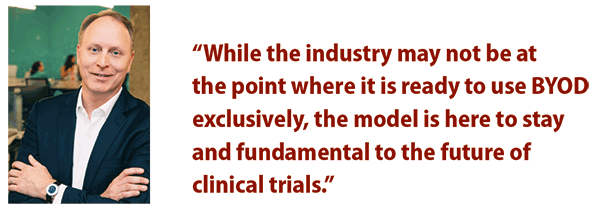
Home » Three Questions
Three Questions
May 7, 2018
Jeff Lee, President, eCOA of Patient Engagement, Bracket
CWWeekly presents this feature as a spotlight on issues faced by executives in clinical research. This week we hear from Jeff Lee, President, eCOA of Patient Engagement, Bracket. Jeff joined Bracket in 2017, following the acquisition of his company, mProve Health, which he founded 2010. As CEO of mProve Health, a leading provider mobile technologies for patient recruitment, engagement, and data collection in clinical research studies, Jeff grew the company globally.
Question: Do you think the clinical trial industry is ready to use a Bring Your Own Device (BYOD) model for ePRO on any study?
Answer: The bring your own device approach is gaining momentum in the industry as the FDA continues to push for greater use of ePRO in clinical trials. As the possibilities of BYOD drive forward, it is becoming more feasible to use this type of approach on any study. However, many sponsors are understandably wary of jumping all in. There is conservative preference to await formal FDA guidance on this topic, as well as few examples of the successful BYOD on regulatory approved studies. While the industry may not be at the point where it is ready to use BYOD exclusively, the model is here to stay and fundamental to the future of clinical trials. Today’s patients are more tech savvy than ever before and are ready to accept BYOD. It’s up to the clinical trial industry to embrace this readiness and make the shift.
Question: What is happening in the industry that is affecting perspectives about BYOD?
Answer: The growth in smartphone penetration has brought increased opportunities for BYOD. However, the movement has been stalled for years at a “BYOD stalemate”: the FDA cannot issue any statements on the validity of data sourced from personal devices without seeing drug studies that are using this type of approach. Conversely, pharma companies are reluctant to risk the success of their clinical trials on a data collection method that the FDA hasn’t formally blessed. At Bracket Global we are working to break this deadlock and demonstrate how personal devices can be used more widely on studies.

mProve Health, a Bracket Company teamed up with ICON and Medidata in 2016 to conduct a comprehensive survey to better understand industry attitudes toward collecting data on personal devices. This survey polled clinical trial and outcomes research specialists on potential hurdles such as: “subjects may lose or change their device”, or that the “data collected may not be private”, “that site staff would be burdened” or “that the patient would delete or corrupt the app”, etc. Overall, most respondents were “unconcerned” or only “a little concerned.”
Given the industry’s considerable debate over modality equivalence and validated data, one might expect eCOA leaders to be extremely concerned about the equivalence of surveys completed across different devices. On the contrary, over half of the respondents to the survey neither agreed nor strongly agreed that “testing was required on all possible devices”; and over half agreed or strongly agreed that “demonstrating equivalence on a single device was acceptable if all subjects could be guaranteed to use a device of a minimum screen resolution and size.”
Question: What’s the Choose Your Own Device (CYOD) model? And how does the CYOD methodology support greater flexibility for sponsors and patients?
Answer: Choose Your Own Device, allows patients to choose to use their personal device or a provisioned solution. By providing a choice, patients benefit from increased flexibility and optionality. Non-smartphone owners or patients who prefer not to use their personal device for the study can select to use a provisioned device, while patients who prefer to centralize study commitments and personal needs on a single device can choose to use their own.
Under the CYOD model, patients can decide what works best for them. The patient centricity movement has gained traction throughout the industry, so giving patients the ability to choose how they participate in an ePRO study only makes sense. Partial provisioning — usually anywhere from 25-75% — offers a middle route that can avoid the hurdles of requiring 100% BYOD and the inconvenience of full provisioning. Offering choice over which device patients use will flatten the learning curve going into the study. It will also make the study more convenient for the patient in the long-term, whether that means not being committed to expensive personal smartphone ownership or the freedom from carrying multiple devices. Removing device frustration will eliminate a big obstacle for the tech-wary or the dropout-prone. For clinical research teams and investigative sites, the use of patients’ own devices also removes the need to deliver training or supply hardware.
As the industry pushes forward in navigating its journey towards 100% BYOD, CYOD is proving to be an ideal stopover point.
Upcoming Events
-
21Oct




